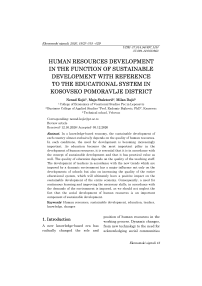Human resources development in the function of sustainable development with reference to the educational system in Kosovsko Pomoravlje District
Автор: Kojić Nenad, Staletović Maja, Dajić Milan
Журнал: Ekonomski signali @esignali
Статья в выпуске: 2 vol.15, 2020 года.
Бесплатный доступ
In a knowledge-based economy, the sustainable development of each country almost exclusively depends on the quality of human resources. In such conditions, the need for development is becoming increasingly important. As education becomes the most important pillar in the development of human resources, it is essential that it is in accordance with the concept of sustainable development and that it has practical value as well. The quality of education depends on the quality of the teaching staff. The development of teachers in accordance with the new trends which are imposed by a dynamic environment has a major influence not only on the developments of schools but also on increasing the quality of the entire educational system, which will ultimately have a positive impact on the sustainable development of the entire economy. Consequently, a need for continuous learning and improving the necessary skills, in accordance with the demands of the environment is imposed, as we should not neglect the fact that the social development of human resources is an important component of sustainable development.
Human resources, sustainable development, education, teacher, knowledge, changes
Короткий адрес: https://sciup.org/170204065
IDR: 170204065 | DOI: 10.5937/ekonsig2002015K
Список литературы Human resources development in the function of sustainable development with reference to the educational system in Kosovsko Pomoravlje District
- (2020) Digital Competence Framework: Teacher for the Digital Age 2019. www.zuov.gov.rs
- Bećirović, S. (2015) The impact of social change on the role and reponsibility of teachers in modern educational systems. New Muallim, (62), 114-121
- Bilinović, A., Škorić, J. (2015) Education as a factor of social development. u: Regions and Regionalization: A Comparative Analysis, Novi Sad: Faculty of Philosophy, IV, 43-62
- Dajić, M. (2017) Uloga i značaj inovacija u razvoju privrede Srbije. Ekonomski signali - poslovni magazin, vol. 12, br. 1, str. 55-64
- Gavrilović, B.J., Radivojević, B. (2017) Educating the population for the future and the future of education. Population, 55(1), 63-85
- Gošović, R., Petrović, D.S. (2016) Standards for the teaching profession and their professional development. u: Intercultural education in Serbia: Regulatory framework, situation and opportunities for development, Belgrade: Center for Educational Policies, 71-75
- Ilić, B., Sovtić, K., Mihajlović, D. (2019) Economic and ecological sustainability of Serbia/condition of quality of life and environment protection. Ecologica, 26(94), 193-198
- Janković, M., Jovanović, L., Gajdobranski, A., Jović-Bogdanović, A. (2019) The role of digital economy in protecting the environment and ecosystem from natural disasters. Ecologica, 26 (94), 153-158
- Jovanović, B. (2017) New information technologies in economics. u: Scientific conference ECONBIZ, (17), 359-366
- Kazakovs, M., Verdina, A., Arhipova, I. (2015) Automation of human resources development planning. Procedia Computer Science, 77, 234-239
- Knežević, M., Veselinović, P. (2015) New Education Policy's Priorities as a Function of Economic Development of Serbia. Economics, 61 (1), 151-159
- Martín-Gutiérrez, J., Mora, C.E., Añorbe-Díaz, B., González-Marrero, A. (2017) Virtual technologies trends in education. EURASIA Journal of Mathematics Science and Technology Education, 13(2), 469-486
- National Education Council (2020) Education in Serbia to achieve better results. www.cipcentar.org
- Obradović, J., Arsić, S., Veljković, M. Serbian labor market as a mirror of (in) harmonization of the education system and the real needs of the economy. u: University in change: Conference Development trends (XXI), Zlatibor, 1-4
- Pavlović, R., Stamenković, S. (2018) Investing in human capital: A determinant of business success of organizations. Megabiznis, 2/1, 25-38
- Pozar, H. (2016) Competences of teachers in modern educatio. Synthesis, (10), 23-34
- Radosavac, Z. (2016) Human resources development as a prerequisite for organizational success. Journal of Economics and Market Communications, 6(1),161-176
- Regional Center for the Environment Education for Sustainable Development. http://documents.rec.org
- Stanojević, D. (2015) Human resources as a factor of economic development. Svarog, (10),285-292
- Sučević, V., Kerić, M. (2015) Elements and indicators for identifying the quality of primary education. Synthesis, (7), 19-32
- Tančić, N.D., Vuković, L.B., Malčić, B.D. (2017) Professional development of teachers through the concept of horizontal learning and teacher forums. Proceedings of the Department of Pedagogy, (26), 109-121
- Todorović, M. (2019) Ideology and position of teachers in education. International Journal Scientific Papers, 11/2, 46-50
- Vrhovac, V., Orošnjak, M., Cvetković, N., Žižakov, M., Nikolić, D. (2017) New learning technologies in higher education. u: Conference Development trends (XXI), Zlatibor
- Zakić, K. (2018) Historical overview of human resource management development in the People's Republic of China. Megatrend University, 28-34


